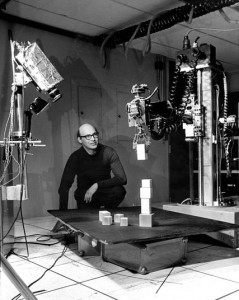
By Kristinn R. Thórisson
I took Marvin Minsky’s class ‘Society of Mind’ in 1991. I would have taken it in 1990, when I started my studies at the MIT Media Lab, but he only taught it every other year. To get in we had to prove to him that we had read his book of the same title – which I did – and that we were genuinely interested in the topic – which I was – possibly more so than the majority of the 30 or so students who took the course that year. So, as luck would have it, I had a year to prepare for it.
His course was, in the words of Bostonians, wicked awesome. Finally, I had found a mentor who could answer the hard questions I had about the mind. And boy did I have questions. Since my teens I had dreamed of creating an artificial mind.But the main thing Minsky taught me was not how to answer questions, but in fact quite the opposite — how to ask questions. He handed us a long list of his own questions, any one of which he said “might unlock the secrets of intelligence” if we ever were to find the right answer, and asked us to pick some to write essays about.
Marvin was brilliant, but he was also a harsh critic of his adversaries and academic peers. With his sharp intellect he would regularly slash his opponents’ opinions to pieces, with no hope of reassembly, using either principled argumentation or personal derision — and most often both.
We wrote 3 essays in the Society of Mind class. My first was about music. When I got his comments back he had made a small remark next to my theory of why we get bored of a piece of music — because we get good at predicting it. His comment read “good idea!”. I thought he was mocking me, because surely such a brilliant man would have thought of this already.
But while Minsky always spoke as if he knew all the answers, his actions, comments, and teachings in that class admitted that science still didn’t have a good handle on how to create an intelligent machine. As would slowly dawn on me over the coming years and decades, Minsky’s ideas and understanding — razor-sharp and unfathomably wide-ranging as they were — did not do a whole lot to propel the state of artificial intelligence forward. He was nevertheless a big influence and an inspiration to me, and I learned a lot from his class, books and papers.
Marvin taught me two important things that have guided me in my career. The first one is: If you ask good questions you have a chance of furthering our state of understanding, and understanding is a prerequisite for driving scientific research. (Incidentally, Marvin was also the first person to provide me with a good explanation of what understanding is.) The second thing was this: Deriding your peers does not pay off. While it may force people to pay closer attention to what you are saying, it will also make you enemies. And it won’t make your ideas clearer, or better.
